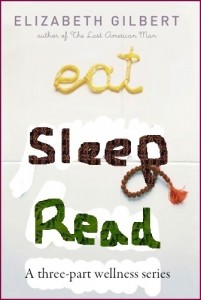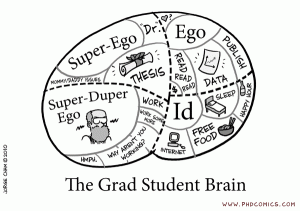Eat, Sleep, Read is a three-part series on wellness in grad school. MAPH is a challenging year in a lot of ways, but you can make it way easier physically, mentally, and emotionally by taking care of yourself and managing your workload. For Part III, we’ll cover some academic tips that might help you manage your workload and deal with school-related stressors.
Obviously, one of the biggest stressors in grad school is the workload. In fact, it’s probably the biggest stressor. Getting enough sleep, exercising regularly, eating well—all these important aspects of wellness become difficult to maintain because there’s constantly so much to get done. So we’ve come to the last (and perhaps most important) post of this wellness series: how to manage your academic workload and find some balance in grad school!
Know your personal challenges. Know your resources.
It’s useful to take a little time to reflect on your own academic habits—this is the first step to figuring out the best way to use all the sundry resources UChicago makes available to you as a grad student. Do you always have trouble with procrastination? Check out ASAP’s time management resources. Know you always get stuck while drafting long papers? Plan ahead and schedule a consultation with the writing program.
Here’s a quick survey of some of the best resources available to you as a MAPHer:
- Jeff McMahon: If you haven’t yet visited this delightful, calming, brilliant human being, definitely do so. You can sign up for his office hours on Chalk—Jeff is great for brainstorming papers, serving as a sounding board for arguments, and bringing clarity/structure to your whole thought process about writing.
- ASAP (Academic Skills Assessment Program): Run by Student Counseling Services, this service helps with a variety of problems we encounter in our academic lives. Procrastinate too much? Have writer’s block? Want to learn speed reading? ASAP has workshops for all of these, and you can also schedule individual consultation sessions where counselors will point you to a host of other resources depending on your needs.
- Writing Program: Our friends over at the Writing Program have implemented a whole host of new offerings for grad students this year—check out the offerings here. Most impressive is a new initiative called Graduate Writing Consultations. Sign up for one of these sessions, and you can send in up to ten pages of writing (from a final paper, thesis draft, etc.) and then meet with a trained Graduate Writing Consultant to workshop your draft materials. This is an incredible service, and I’m super jealous it wasn’t available last year—make good use of it!
- GSA: Keep up with Graduate Student Affair’s academic offerings. They have all kinds of great resources to help you academically, including programming like a Spring Break thesis write-in.
Triage, triage, triage. (And don’t stress about it.)
The craziest thought you can have in grad school is that you have to read everything; disabuse yourself of that notion right now.

Don’t let the advisor “super-duper-ego” get to you.
Oftentimes, grad students complain that the amount of reading/work that they are assigned is impossible. Guess what? It is. When you are in a scenario where an impossible demand has been placed on you, there are two options as I see it: 1) get irrationally upset at yourself for being unable to meet said impossible demand or 2) rationally acknowledge the impossibility of the demand, and thus free yourself to work within your own abilities.
Might I recommend the latter? The worst thing you can do is let yourself get frustrated with too much reading/writing—when you’re inundated, there’s only one option: triage your work and simply do what you can! Pick the most important things you can do on that day, and get them done. Finish the thesis pages you have due the next day, and let yourself skip (or simply skim) the third article you were going to read for that seminar. Do all that you can, and don’t let the irrational demands of academia induce work-guilt. You can only do what you can do—so just do that, and forget the rest!
Instrumentalize reading.

The average weekly reading for a grad student.
We’re people who like reading for reading’s sake, but in grad school you have to read with a purpose. Can I come up with two or three points to make about this article in class tomorrow? Should I read this whole thing because it’s immediately relevant to my thesis?
The best advice I got in college: be able to summarize every article you read in a single sentence. That’s having read it. Read in order to do that. This frees you from scrutinizing over every word, every paragraph, every page in a way that feels interminable.
This instrumentalization can take different forms, of course. Are you reading something to use it in your thesis? Then read as much as is relevant to your thesis, and stop there. The point here is that to make reading an instrumental, end-oriented activity. Decide what you want to get out of reading this article, or that book—then simply read for that purpose!
DON’T read.
Watch some TV. Go to the gym. Walk by the lake. Go on a date. Catch up on laundry. Bake something. Then eat it. See a movie. Visit the North side. Go to a concert. Grab a drink at Jimmy’s. Grab a drink anywhere but Jimmy’s. Call your mom. Read (but for pleasure!).
Sometimes the best way to be productive is to allow yourself to be unproductive for a stretch of time. Take a Saturday to go do something fun. When you return to your work the next day, your eyes will be fresher. Remember: becoming a grad student does not mean you stop being a person!
—
This concludes Eat, Sleep, Read: A Wellness Series—check out our previous posts on eating well and sleeping right, too!